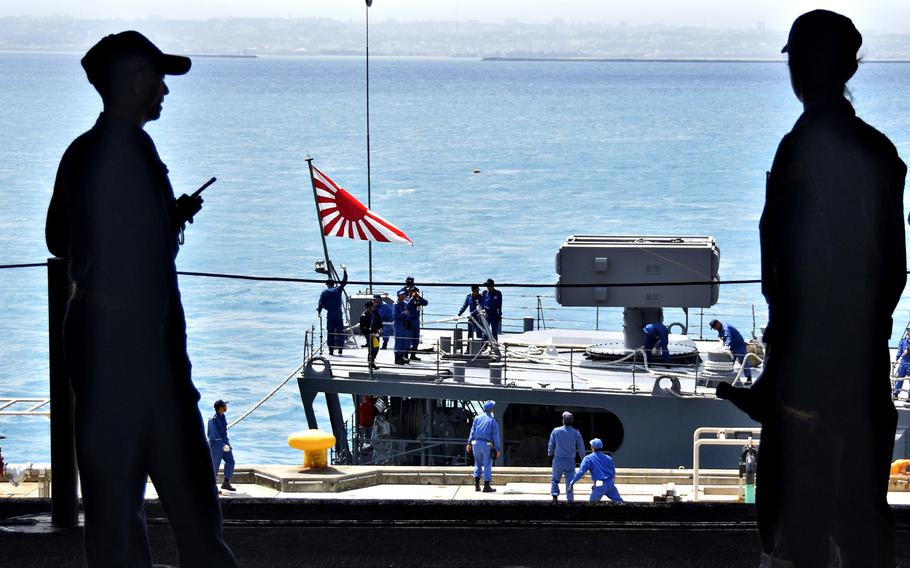
A Rising Sun flag flies from the Japanese destroyer JS Yuugiri near Okinawa, April 22, 2018. (U.S. Navy)
A Japanese warship will raise the Rising Sun flag during an upcoming multinational exercise in South Korea, Japan’s defense minister said Friday.
The Maritime Self-Defense Force — Japan’s navy — “will fly the ensign of self-defense by following the national law,” Yasukazu Hamada told reporters at a Tokyo news conference, according to a transcript on the ministry website.
The Eastern Endeavor maritime interdiction exercise will take place between Tuesday and June 2 at South Korea’s southern Jeju Island. Naval personnel from South Korea, the United States, Japan, Australia and Canada will stop and board ships simulating the transport of weapons of mass destruction, according to South Korea’s Ministry of Foreign Affairs.
The allied navies will also discuss methods to combat North Korea’s “means of delivery” of those weapons, according to a ministry news release.
The Japanese destroyer JS Hamagiri is scheduled to attend the exercise, a spokesman for Japan's Joint Staff said Friday. A Japanese warship could also visit Busan, South Korea’s largest port, Japan's the Yomiuri newspaper reported Thursday.
Japanese warships routinely fly the Rising Sun flag, which has been the official ensign of the Maritime Self-Defense Force since 1954, according to the Foreign Affairs Ministry.
However, the flag is also associated with Imperial Japan, which waged war in the Pacific during World War II, and with Japan’s colonization of the Korean Peninsula from 1910 to 1945. The flag’s symbolism and other unresolved historical disputes dating to Korea’s colonization have often railroaded diplomatic relations between Seoul and Tokyo.
The origin of the Rising Sun symbol dates to 1870.
For the Japanese, the flag is not an “expression of political or discriminatory assertions,” according to the Foreign Affairs ministry website. Tokyo “will continue to explain at every opportunity its view that the display of the Rising Sun Flag is not political promotion to the international community,” including South Korea.
The Hamagiri may raise the Rising Sun flag during the exercise according to “international practice,” Jeon Ha Gyu, spokesman for South Korea’s Ministry of National Defense, said at a news briefing Thursday.
"As far as we know, a national flag of a country and a flag symbolizing the nation’s military or organization is usually on a foreign vessel entering another country’s port,” Jeon said. “This is perhaps a common practice being used in the world, as far as we know.”
The flag attracted attention in November when South Korean sailors rendered a salute toward a Japanese warship flying the Rising Sun during the Japan International Fleet Review at Sagami Bay near Yokohama.
South Korean Democratic Party lawmaker Jeon Yonngi likened the salute to paying respects to a war criminal.
Jeon, speaking Nov. 7 at a National Assembly hearing attended by Defense Minister Lee Jong-sup, questioned whether “internationally accepted” is an acceptable standard.
“We were humiliated under Japanese imperialism for 36 years, when Tokyo was saying it will conquer the world while hoisting this flag,” Jeon said to Lee.
South Korean President Yoon Suk Yeol, on a state visit to Tokyo on March 16, said he hoped to work with Prime Minister Fumio Kishida “to create brighter bilateral ties for future generations.”
Yoon and Japanese Prime Minister Fumio Kishida met again May 7 in Seoul, where Yoon said: “We must move away from the thinking that we will be unable to take any steps toward future cooperation unless the two nations put a total end to all issues of the past,” the Asahi newspaper reported that day.
Yoon, the first South Korean president to visit Japan in 12 years, pledged after taking office to mend ties with Japan.
“I can’t accept the notion that because of what happened 100 years ago, something is absolutely impossible [to do] and that they [Japanese] must kneel …,” Yoon said in a Washington Post interview published on April 24.